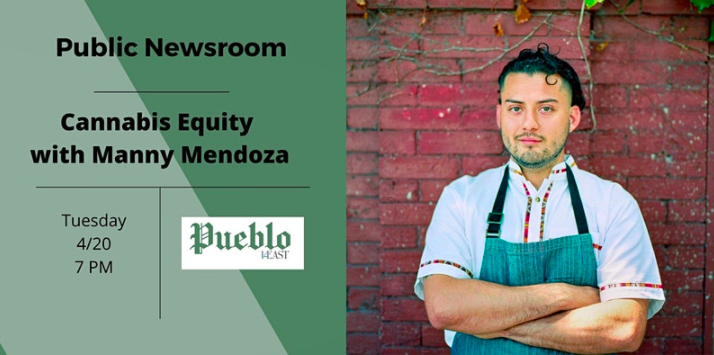Last Tuesday Pueblo hosted their third public newsroom of the year –– a conversation with renowned Pilsen chef and cannabis equity advocate Manny Mendoza. He is the co-founder of Herbal Notes, a supper club experience, and was recently featured on the Netflix competition show Cooked with Cannabis. The public newsroom was important not only because of its coincidence with the 4/20 holiday, but because, in the past year or so, the legalization of cannabis in Illinois has brought about some radical changes as well as frustratingly familiar obstacles for entrepreneurs of color.
As one of these entrepreneurs, Manny was an incredibly informative and inspiring person to speak to about maintaining BIPOC businesses in our communities and educating others about long-held cultural stigmas against cannabis.
During our hour-long conversation, we talked about cannabis consumption as an ancestral practice in many Latin American cultures, with Manny specifically referencing his Salvadoran heritage, as well as the current troubles in the white patriarchal business structure of the cannabis industry. Towards the end of our time, Manny answered audience members’ questions and took us more in-depth in how he practices advocacy at his events.
Here are five takeaways from the Public Newsroom, courtesy of the Pueblo staff:
The natural role of cannabis
One part of Mendoza’s advocacy is educating people on how cannabis is not just some drug but a plant that has a relationship with the human body, which itself has an endocannabinoid system. While, yes, cannabis can be indulged in for a fun time, it also plays a deeper role not only in Latin American cultures but in the body. He encourages his clients to consider this, to understand this and be grateful for what the earth has to offer us.
Manny’s connection to food
The criminalization of weed, and its disproportionate impact on Black and Latino communities, specifically, is forgotten through its combination with cuisine. From the very beginning, Mendoza’s outlet in the culinary world breaks through the negative stigmas surrounding weed in communities of color and the controversial use of weed. Mendoza opens up minds to the intersection of food and cannabis.
Getting involved as a cannabis equity advocate
Block Club Chicago reports that less than two percent of dispensary owners are Black or Latino and less than 25 percent are women. Advocacy groups in the city are fighting to bridge the gap and promote equity in the Illinois cannabis industry. One group Mendoza referenced is the Cannabis Equity Coalition Illinois. The group works to help individuals expunge criminal records including cannabis offenses, host Know Your Rights workshops and in general advocate for a more equitable industry in the state. The group meets virtually every Thursday via zoom.
Supporting local businesses, and finding them on your own
Our guest talked about local businesses that he follows and supports and what he appreciates about the work they do. These businesses, Mendoza says, are more than likely going to respect the long-held ancestral keepsafes of knowledge, seeing neither the customer or the product as a number but as the important agents of change that they are (which larger, profit-driven businesses will more than likely not). Nonetheless, he also made a note that people should do their own searching when it comes to supporting small business. Which entrepreneurs have similar values to you? You won’t know until you go out to discover who you can support.
There is much progress to make
As mentioned earlier, marijuana was legalized for commercial consumption in Illinois just over a year ago. While a lot has changed, many of the inequalities that have most deeply traumatized Black and Brown communities have stayed the same. Ultimately, it’s the consumer with their buying power that provides hope and funds to the business owners they want to see succeed. Mendoza’s advocacy shows us that the victories made in the recent past are just the beginning for a more fair and understanding world when it comes to cannabis.




NO COMMENT